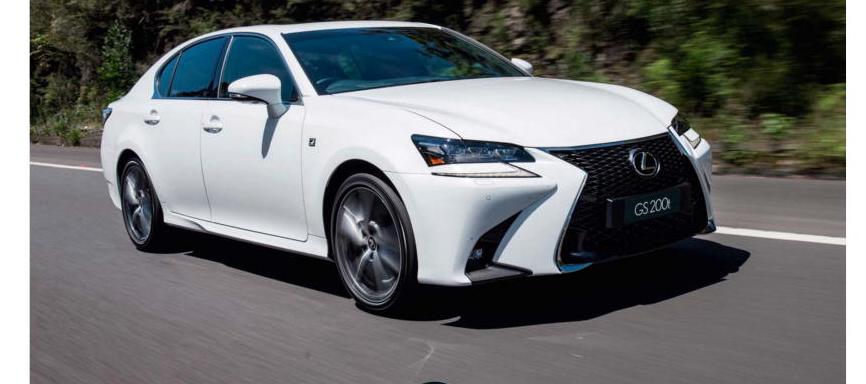EVERYBODY’S doing it – Ferrari, BMW, even Porsche. Downsizing, that is. So when Lexus decides to put a turbocharged fourbanger in its BMW 5 Seriessize GS sedan, it shouldn’t come as much of a shock.
The GS200t’s 2.0-litre turbopetrol is an absolute peach.
While it makes the same power as the RC200t, its refinement and buttery-smooth character suit the GS’s premium mantra perfectly.
Lolling about town, the refinement of the engine isn’t immediately obvious because it’s so quiet. In fact, you needn’t bother with the hybrid GS; the near-silent operation of the 200t is remarkable.
At $75,000, the Luxury spec is the entry point for the two-tier line-up, which is headlined by the larger-wheeled, more aggressively styled GS200t F-Sport at $83,000.
The GS has a spacious cabin, with solid, well-finished materials that look a little dated, but it is well finished and executed. It also avoids the dreaded foot-operated park-brake of other Lexus models.
Yet the depth of the GS200t’s talent stretches from aroundtown limousine-like refinement to a dynamic ability that’s pleasantly surprising. The ride on the F-Sport’s 19-inch alloys may not be as silken as the driveline combo, but the GS’s cornering abilities reveal an agility that’s completely unexpected.
The steering doesn’t offer a lot of feedback, despite the chassis communicating the surface beneath, but the roll into corners is well controlled and overall handling is benign and predictable, with strong roadholding allowing a concerted attack through any corner.
Part of this car’s dynamic ability is courtesy of the new ‘performance damper’ fitted to all GS models, which better isolates the front-end, while there’s also revised spring rates and a new shock absorber piston shape, all aimed at reducing NVH.
When pushed, the 2.0-litre livens up, with good response, but it’s more a flow of power than a strong surge, and the eight-speed automatic upshifts briskly and smoothly at 6000rpm. The engine note builds, but even under full load it maintains its hushed composure, never over-reaching to become coarse, nor showing signs of struggle.
Its 7.3sec 0-100km/h claim is a whopping 1.3sec quicker than the GS250 V6 that this car replaces, and its 8.0L/100km economy is significantly better than the V6’s 9.3L/100km as well.
The $75K starting price is almost $3K more, but there is more gear, including a Pre- Collision Safety System. With all that refinement and polish, the GS200t won’t have you rushing to your destination, but it fulfils its premium brief well.The GS will face increasingly tough opposition in 2016. The new-generation Jaguar XF, which is not only a dynamic dream but far more opulent than its predecessor, will be keeping Lexus salespeople awake at night. But the real nightmare will be the new Mercedes-Benz E-Class that arrives in October, taking over the role of Merc’s techno tour-de-force from its S-Class flagship. And before the year is out, an all-new BMW 5 Series and Audi A6 are expected to be unveiled before arriving here in 2017.
Dated interior; base-car cabin feels low-spec; only two trim levels Engine and cabin refinement; fit and finish; far superior to the old V6
Model Engine Max power Max torque Transmission Kerb weight 0-100km/h Economy Price On sale Lexus GS200t F-Sport 1998cc 4cyl, dohc, 16v, turbo 180kW @ 5800rpm 350Nm @ 1650-4400rpm 8-speed automatic 1725kg 7.3sec (claimed) 8.0L/100km $83,000 Now





